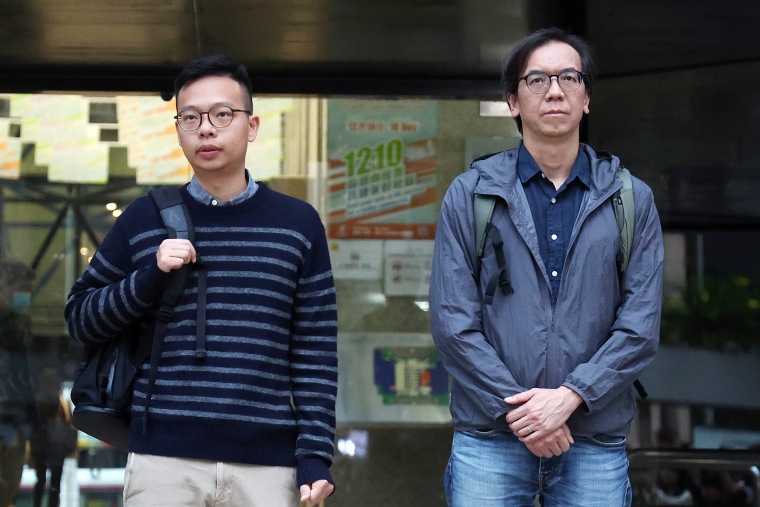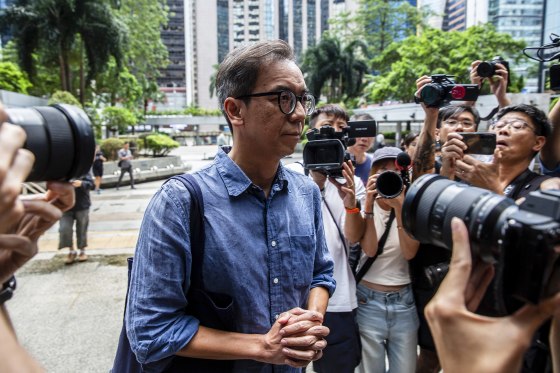Two Hong Kong journalists who led a pro-democracy newspaper were sentenced to jail Thursday after they were convicted of sedition last month in a verdict seen as a further blow to press freedom in the Chinese territory.
Chung Pui-kuen, the former editor-in-chief of the now-defunct Stand News, was sentenced to 21 months, while Patrick Lam, the newspaper’s former acting editor-in-chief, received 14 months as a starting point but after reductions was immediately released because of a serious health condition. Both men had already served close to a year in pretrial detention.
Founded as a nonprofit in 2014, Stand News became known for its live-streamed coverage of mass pro-democracy demonstrations that roiled the city for months in 2019, gaining hundreds of thousands of followers and angering government officials. It shut down in 2021 after a raid by national security police.
Chung and Lam were convicted last month over 11 articles deemed as having “seditious intentions,” including several commentaries by Hong Kong pro-democracy activists now living in self-exile.
The U.S. and other Western governments had criticized the verdict, with the U.S. calling it a “direct attack on media freedom” while the European Union said it “risks further inhibiting the pluralistic exchange of ideas and the free flow of information.”
Hong Kong authorities welcomed both the conviction and the prison sentences, saying after the verdict that “journalists, like everyone else, have an obligation to abide by all the laws.”
Hong Kong, a former British colony that returned to Chinese rule in 1997 on the promise that its civil liberties would be preserved for 50 years, was long seen as a beacon of press freedom in Asia. But critics say press freedom has deteriorated as part of a broader crackdown on dissent since Beijing imposed a national security law in 2020 in response to the protests.
Chinese and Hong Kong authorities say the national security law, as well as local national security legislation enacted in March, were necessary to restore stability after the protests, which sometimes turned violent.

Chung and Lam, whose trial began in 2022, were the first journalists since Hong Kong’s return to Chinese rule to be convicted under a colonial-era law that made sedition, defined as inciting hatred or contempt against the Chinese central government, the Hong Kong government or the judiciary, punishable by up to two years in prison.
That law has since been replaced by the local national security legislation, known informally as Article 23, which raises the maximum penalty for sedition to seven years and to 10 years if an offense is found to have involved “collusion with foreign forces.”
On Thursday, many people waited in line to attend the hearing, with some bringing their own chairs. Both Chung, 55, and Lam, 36, were at the sentencing, which began more than two hours late.
Their lawyer, Audrey Eu, argued that Chung and Lam were simply doing their jobs as journalists, reporting on social tensions and different people’s opinions.
Judge Kwok Wai-kin, whom Hong Kong’s top leader handpicked to preside over the trial, rejected that claim and said the defendants were not convicted for fulfilling their responsibilities as journalists. He also questioned whether Stand News was doing pure journalism.
“The responsibility of journalists is to tell the truth, not to spread falsehoods or half-truths,” Kwok said. “Only those who intend to skirt the boundaries of the law would worry about inadvertently breaking it.”
In a statement early Friday, a Hong Kong government spokesperson said the articles at issue “were not based on facts,” and that Chung and Lam had used Stand News as “a tool to smear and vilify” Hong Kong and Chinese authorities.
“It is evident that they sided with the protesters against the government,” said the spokesperson, who noted that Stand News had about 1.6 million followers.
The spokesperson also suggested the sentences were not strong enough.
In a mitigation letter submitted to the court, Lam said a police officer told him in the early days of his detention, “We’re each serving our own master.”
Looking back, Lam said, “I regret not taking the opportunity to explain to the officer that journalists do not serve anyone, pledge allegiance to anyone, or oppose anyone. If we are truly loyal to anyone, it can only be to the public.”
Chung wrote in his mitigation letter that many Hong Kong journalists had “steadfastly” remained in the field despite the growing pressures they face.
“To truthfully record and report their stories and ideas is a responsibility that journalists cannot shirk,” he said.
The Hong Kong Journalists Association, a local media group, said after the sentencing Thursday that the prosecution of Chung and Lam had “caused irreversible harm” to journalism in Hong Kong, creating uncertainty around what is safe to publish and encouraging self-censorship.
“This uncertainty can only make journalists in Hong Kong more worried about being blamed at every turn, hampering their ability to perform their constitutionally protected duties,” it said in a statement.
Earlier this month, the group said that dozens of Hong Kong journalists had been targeted by a “systemic” online and offline harassment and intimidation campaign that was the largest in scale it had ever seen.
Selina Cheng, the chair of the group, said that since June, dozens of journalists from more than a dozen media outlets had received threatening and defamatory emails and letters at their homes and workplaces and elsewhere. More than a dozen journalists said complaints had also been sent to their family members, employers or landlords, some of which warned that continued association with the journalists risked breaching national security laws.
Other journalists were the subjects of “hateful content” online, some of which combined their photos with knives and shooting targets.
Hong Kong law enforcement officials have encouraged the affected journalists to file police reports and say the cases will be handled impartially, though Hong Kong’s top leader, John Lee, has declined to explicitly condemn the harassment.
There have also been rising reports of non-local journalists’ being denied work visas or entry to Hong Kong, an international media hub.
Hong Kong ranked 135th out of 180 countries and territories in Reporters Without Borders’ 2024 World Press Freedom Index, compared with 70th in 2018.
The Hong Kong government spokesperson said Friday the right to free expression is guaranteed by Hong Kong’s Bill of Rights as well as its mini-constitution, known as the Basic Law.
“Members of the public (including journalists) in Hong Kong are, as always, free to make comments or criticisms that are based on facts, and to enjoy and exercise freedoms of the press and of speech in accordance with the law, without fear of unwittingly violating the law,” the spokesperson said.
